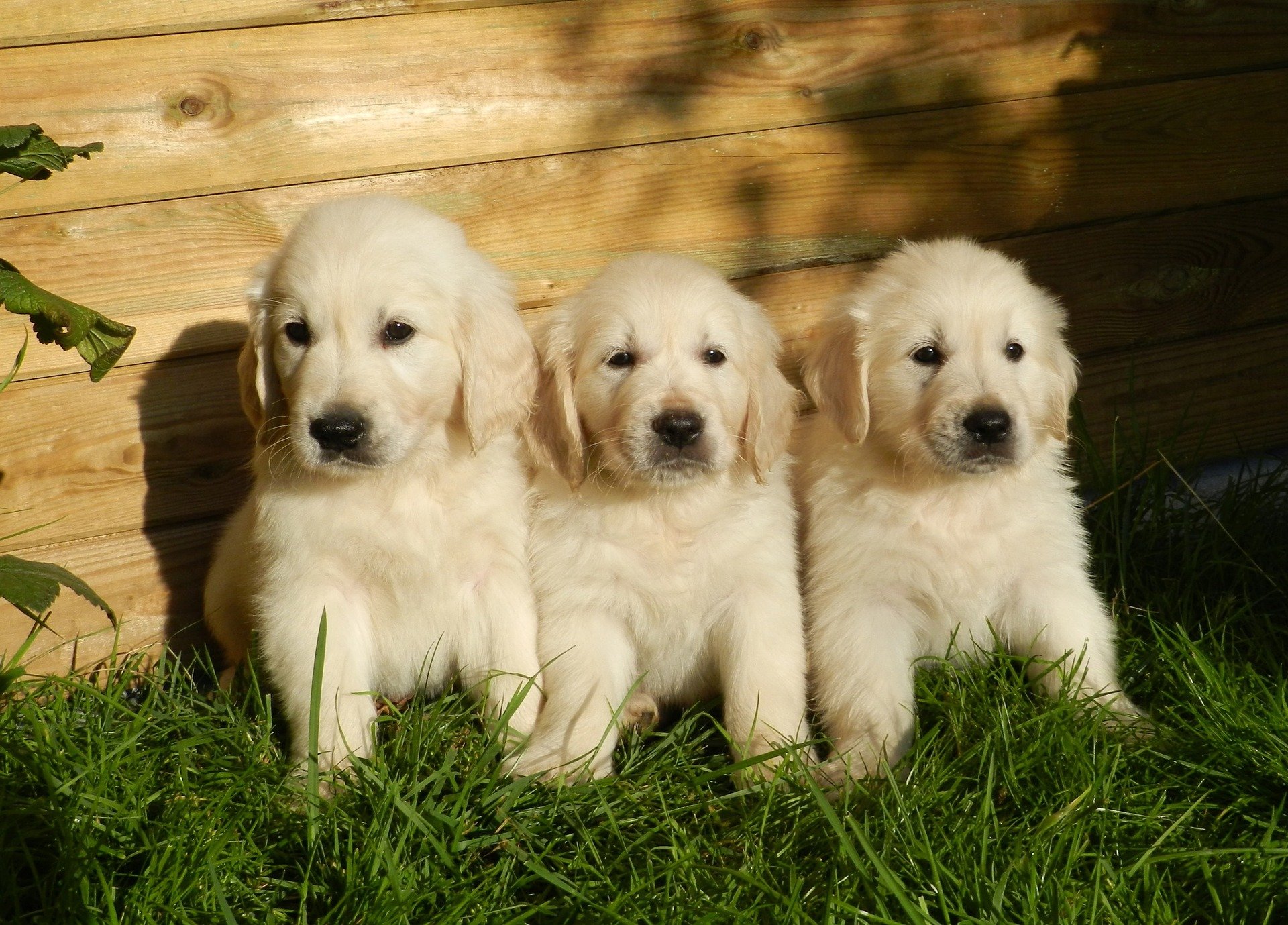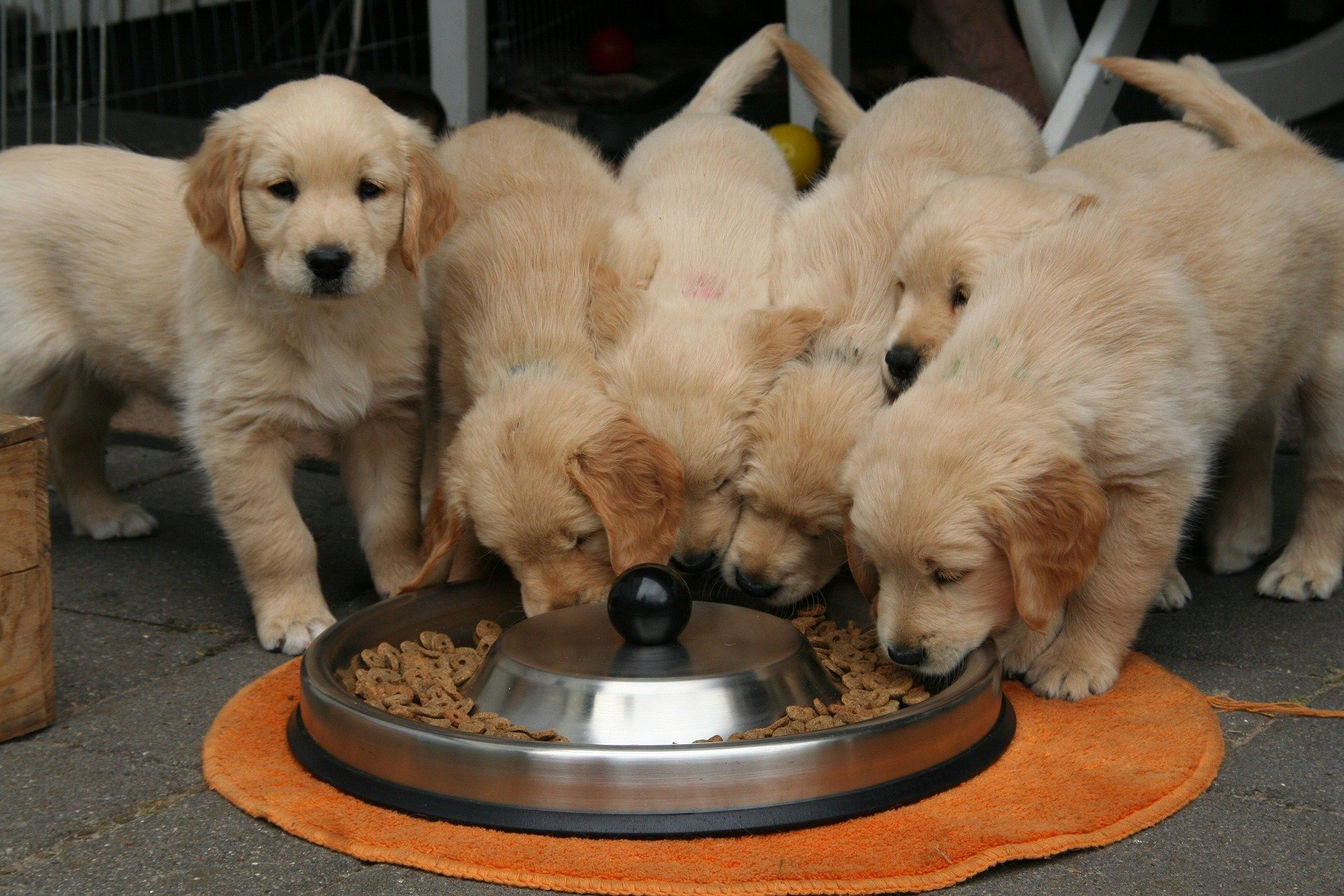Apple pie, football, and golden retrievers? This golden dog is a popular addition to many American households. In fact, golden retrievers rank number 3 in the American Kennel Club’s popularity rankings. Not surprisingly, golden retriever puppies are often seen on many calendars, greeting cards, and posters as the ultimate symbol of canine cuteness.
As much as they are celebrated in the US, golden retrievers weren’t discovered there. In the mid-1800s, they were bred and raised by gamekeepers at an estate owned by Lord Tweedmouth (what a name!) in Scotland. It’s said that he crossed his “yellow retriever” Tweed Water Spaniel (now extinct), an Irish setter, and a bloodhound. This new golden retriever was trained to hunt in the great outdoors.
Golden retrievers are so renowned, two United States presidents owned them while in office. President Ford’s golden retriever was named Liberty, and President Reagan’s dog was Victory.
Golden retriever puppy facts
Also known as “America’s Sweetheart,” golden retrievers are playful, loyal, and carry their puppy-like personality well into adulthood. Golden retriever puppies may be friendly, but they do need plenty of socialization and training to help prepare them for a well-mannered adulthood—when they’re much bigger, but still want to sit on your lap.
| Size | Golden retrievers weigh between 55 and 65 pounds for females and 65 to 75 pounds for males. They reach heights between 21.5 inches to 24 inches at the shoulder. |
| Breed Characteristics | Active and strong, golden retrievers aren’t clumsy. They have a thick, long-ish golden coat and a sturdy build that has become synonymous with the American dream dog. They have short ears, a straight muzzle, and a feathery tail that’s often wagging. Their coat is typically golden or red; English cream golden retrievers are creamy white, as their name suggests. |
| Temperament | Golden retrievers love to play. They also love to play fetch, are natural swimmers, and will attempt to catch waterfowl if given the chance. Their puppy-like energy is maintained throughout adulthood, and they’re fairly easy to train. Goldens make a wonderful family pet and are fiercely loyal to their humans. They love companionship and will not do well when left alone for long hours. |
| Grooming and Health Needs | Golden retrievers shed moderately on a somewhat frequent basis. Their coats are water repellent, so they only occasionally need a bath. Once or twice a year, they shed heavily, so it’s best to brush them out daily during this time.
Golden retrievers are a generally healthy breed, but owners should check their ears for signs of infection and brush their teeth regularly. The National Breed Club recommends that your golden receive the following: hip evaluation, elbow evaluation, cardiac exam and ophthalmologist evaluation. Sadly, golden retrievers are more prone to cancer than other dog breeds—so be sure to provide a healthy diet and get regular checkups at the vet. |
| Training | Between seven weeks and four months, your golden retriever puppy should be exposed to various different kinds of people and situations to develop excellent social skills. They’re highly eager to please, so rewards-based training is effective. Playing fetch is a great way to train your new golden retriever puppy to respond to your cues. |
| Energy Level | Since they are a sporting breed, goldens need plenty of exercise. Golden retrievers love runs, hikes, or even bike rides. Be sure to do a few trial runs before bringing them out on longer excursions like camping or hunting trips. |
| Life Span | Golden retrievers live between 10 and 12 years on average. |
Who is the best human for a golden retriever?
Golden retrievers are a tried and true family dog. They love swimming (even with their humans!), running, and playing in a big backyard. They’re highly social, so a large and active family household works well for them. They also need plenty of affection and snuggles. Due to their hunting heritage, they love to play fetch! Looking to please you, they’re relatively easy to train.
They’re great with children and seniors alike. Golden retrievers do best with plenty of companionship, and so despite their activity level, often do very well with retirees who can devote plenty of time to them.
Getting a golden retriever puppy
Choosing to adopt or go through a breeder for your new golden retriever puppy is a personal choice that requires research. Thankfully, there are many resources out there to help you find a rescue or breeder that offers healthy, ethically-sourced golden retriever puppies.
Knowing what you’re in for when you get a golden retriever puppy is an important step in being a responsible pet owner. Whether you find a responsible breeder or are planning on adopting, it’s up to you to be prepared for an energetic and friendly addition to your household.
Adopting golden retriever puppies
According to the AKC, most breed rescues report that a majority of their rescue dogs come from individual owner surrender, with the most common reasons being a change in lifestyle or the breed not being a good fit. This means that there may be many dogs and puppies out there that are looking for a new forever home.
The main difference between a breeder and a rescue is that a rescue may not always have young puppies to choose from. The benefit, however, is that most are mandated to only adopt out dogs that have been microchipped and spayed/neutered. This means you may end up with a dog that’s already been housebroken, and doesn’t need these common medical procedures. You may also find a golden retriever mix that has all the traits you want from the breed, but with a little extra thrown in.
Finding a golden retriever rescue can be as simple as searching the internet. The AKC also has an excellent list of golden retriever rescues on their site.
Finding a golden retriever breeder
The first step is to do your research. Sadly, there are many puppy mills posing as reputable breeders along with plenty of online scams. Be aware, and reach out to different online forums for conversations about getting your future furry family member.
Be sure to ask questions, make arrangements to meet the parent dogs or mother, and follow your gut. If something seems wrong at a breeder you visit, or the golden retriever puppy seems too good to be true, there’s likely something sketchy going on. The AKC also offers resources for finding a breeder, with fairly strict guidelines on who they let participate.
Golden Retriever puppy resources
After you find the right golden retriever puppy, it’s time to prepare your home! Here are a few resources to get you started:
How to Survive the First 24 Hours with Your New Puppy
How Long Can You Leave a Puppy Alone?
How Often Should I Walk my Puppy?
The Essential New Puppy Checklist




